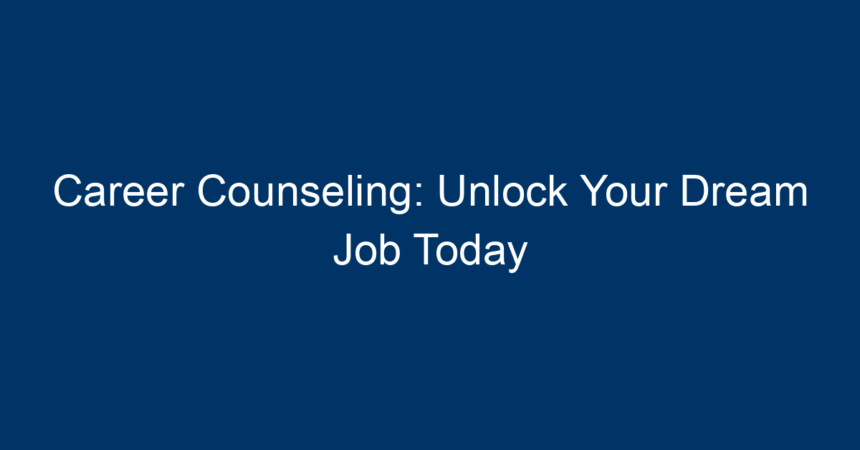In today’s fast-paced world, navigating the complex job market can seem daunting. Many people find themselves asking, “What do I want to do with my life?” or “How can I turn my passions into a career?” This is where career counseling steps in to provide invaluable support and guidance. If you’re feeling lost in your career journey, you’re not alone. Fortunately, career counseling can help you unlock the door to your dream job, leading you toward a fulfilling and successful professional life.
Understanding Career Counseling
What is Career Counseling?
Career counseling is a personalized process designed to help individuals understand their strengths, interests, and professional options. A career counselor works with clients to explore their skills and career paths, helping them make informed decisions about their future. This holistic approach goes beyond job hunting; it encompasses career planning, skill development, and personal growth.
Why is Career Counseling Important?
Finding the right career is more significant than ever. Studies show that job satisfaction directly impacts mental health and overall well-being. With the myriad of opportunities available today, career counseling can serve as a compass, guiding you through the choices. Here are some reasons why career counseling is essential:
- Personalized Guidance: Each person’s career journey is unique. A career counselor tailors their approach, focusing on your individual strengths and weaknesses.
- Skill Development: Counselling often includes skills assessments to identify areas needing improvement, equipping you with the knowledge necessary for career advancement.
- Job Market Insights: Career counselors are updated with industry trends and job market dynamics, providing you with relevant information to make informed choices.
The Process of Career Counseling
Initial Assessment
The journey usually begins with an assessment. During this stage, the counselor may ask questions about your interests, values, and skills. They might employ various assessment tools, such as personality tests or aptitude assessments, to gauge your strengths and weaknesses. This thorough evaluation forms the groundwork for your tailored career path.
Setting Goals
Once the initial assessment is complete, a career counselor will help you define your career goals. This step is crucial as it allows for measurable actions to reach your objectives. Your goals may range from short-term targets (like acquiring specific skills) to long-term aspirations (like landing a job in a particular industry).
Exploring Options
After establishing goals, the focus shifts to exploring occupational options. Your counselor will present various career paths aligned with your interests and skill set. During this stage, you might discover jobs that you hadn’t considered, giving you a broader perspective on your career possibilities.
Creating Action Plans
An effective career plan involves actionable steps. Your counselor will help you develop a realistic and actionable plan tailored to your unique circumstances. This could include updating your resume, enhancing your LinkedIn profile, or planning networking strategies.
Ongoing Support
Career counseling doesn’t end with creating your job search strategy. Many counselors offer ongoing support during your job hunt. This support could involve regular check-ins to assess progress, provide encouragement, and adjust plans as necessary.
Benefits of Career Counseling
Confidence Boost
One of the significant benefits of career counseling is the confidence boost it provides. When you have a plan and know your strengths, you are more likely to approach job applications and interviews positively. This newfound confidence can greatly influence your success in securing your desired position.
Networking Opportunities
Career counselors often have extensive networks and connections in various industries. This can open doors for you, providing job leads and opportunities that may not be readily available on job boards. Networking is a critical component of a successful job search, and a counselor can facilitate these valuable connections.
Work-Life Balance
Through career counseling, you can gain insights into how to achieve a balance between your professional and personal life. A fulfilling career often correlates with overall happiness. Counselors can help you identify roles that align not just with your skills but also with your lifestyle preferences.
Finding the Right Career Counselor
Credentials and Experience
When seeking career counseling, it’s essential to look for a qualified professional. Check their credentials, such as degrees in psychology, counseling, or human resources, and ensure they have relevant experience in the field.
Specializations
Some counselors specialize in specific careers or industries. If you have a particular field in mind, look for a counselor who has experience in that area. Specialized counselors can offer targeted advice and insights, making your sessions more productive.
Personal Rapport
The relationship between you and your counselor is vital. Look for someone who makes you feel comfortable and understood. Many career paths can be deeply personal, and having a counselor who listens and empathizes can significantly enhance the counseling experience.
Actionable Insights for Your Career Journey
- Take a Skills Inventory: Before starting any counseling, create a list of your skills, strengths, and passions. This will provide a solid foundation for your sessions.
- Be Open-Minded: Be willing to consider career paths you might not have thought of. Sometimes the most fulfilling jobs are hidden in unexpected places.
- Utilize Resources: Explore online resources, workshops, or professional organizations relevant to your interests. This can enrich your understanding and expand your options.
- Stay Proactive: Your career path is ultimately your responsibility. While a counselor can guide you, taking the initiative to explore and learn is essential.
Conclusion
Career counseling is a powerful tool for anyone seeking to unlock their dream job. By providing personalized guidance, ongoing support, and insights into the job market, career counselors can help you navigate the complexities of today’s professional landscape.
Remember, the journey of self-discovery and career exploration is not a sprint but a marathon. With the right support, you can confidently take the steps needed to achieve fulfilling employment that resonates with your passions and skills. So take that first step—consider starting your career counseling journey today! Your dream job awaits.




